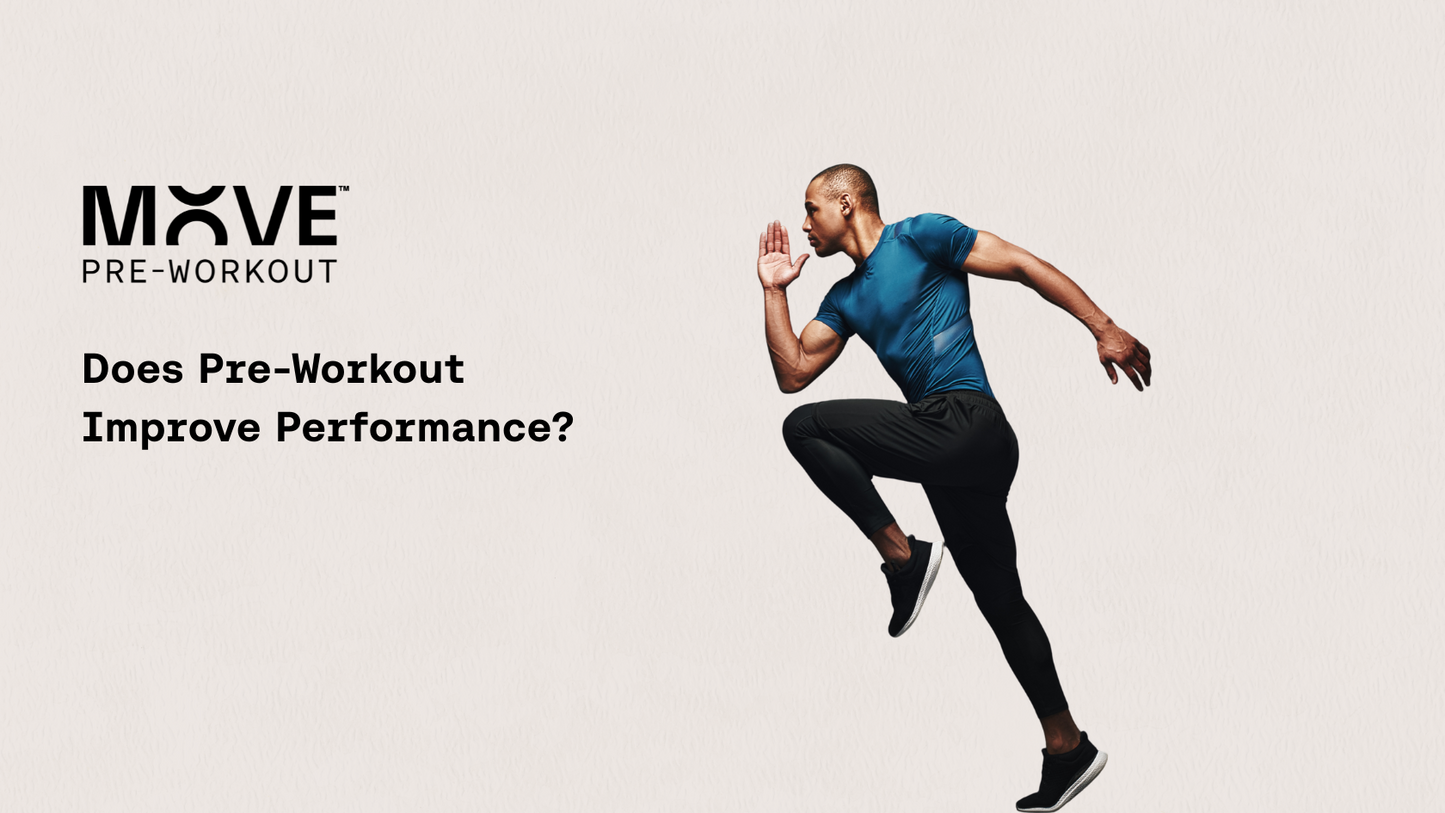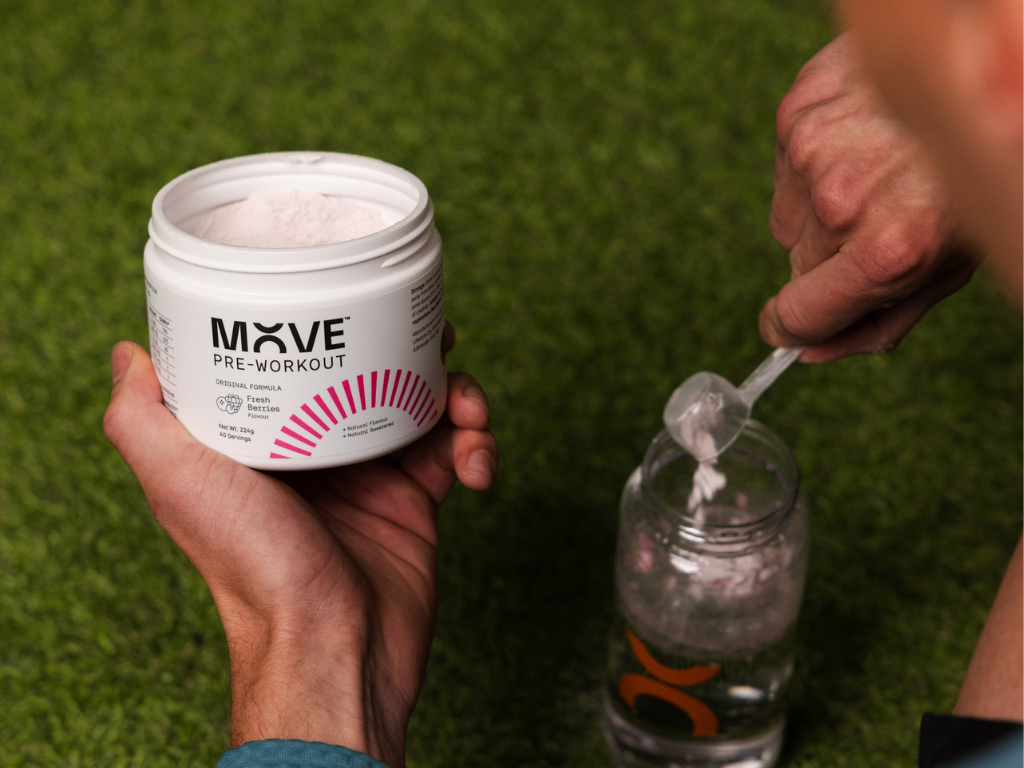
If you’ve ever wondered whether that scoop of pre-workout is actually helping your workout, or if it is just giving you a caffeine buzz, you’re not alone.
For UK gym-goers and athletes, the conversation around pre-workout supplements is loud, sometimes hyped, and rarely clear.
We want to help you separate the signal from the noise.
The short answer:
Yes, pre-workouts can improve performance. But how much they help and how safely depends entirely on what’s inside the scoop. Let’s unpack the science.
What are Pre-Workout Supplements?
A pre-workout is a blend of ingredients designed to improve your energy, focus, endurance, and performance when taken before training (usually 30–60 minutes prior). Most formulas include some combination of any or all of the following:
- Caffeine
- Amino acids (like L-Tyrosine)
- Nitric oxide boosters (like L-Arginine)
- Nootropics or B vitamins
Different blends serve different goals. Some blends are crafted for strength and power, some to boost stamina and mental clarity, and others to support endurance training.
The Science: What the Research Actually Says
Our team at MOVE Pre-Workout reviewed findings from 4 UK and international studies and found the following:
Study 1: The Impact of Pre-Workouts on Power Output and Muscle Fatigue During Sprints
To begin, one of the most direct investigations into pre-workout efficacy was carried out by Panayi and Galbraith (2022). Their study, entitled “Acute Ingestion of a Commercially Available Pre-workout Supplement Improves Anaerobic Power Output and Reduces Muscular Fatigue” looked at how a commercial pre-workout product influenced short-burst cycling performance in healthy young adults.
By comparing three different conditions (water only, a placebo, and a true pre-workout), they were able to tease apart whether the supplement itself, rather than expectation or hydration, was responsible for any performance improvements.
- Study Design: Double‑blind crossover study with three conditions or groups (1-Baseline where only water was given, 2-placebo group, 3-pre-workout group)
- Sample Size: 18 healthy adults (12 males and 6 females), with a mean age of 23
- Results: (1) Peak power output is higher with pre-workout vs placebo and baseline groups. (2) Fatigue index reduced with pre-workout as compared with the placebo and baseline groups.
Study 2: Impact of Multi-Ingredient Pre-Workouts (MIPS) on Exercise Performance
While the first study looked at short sprints, other research turned to upper body strength and endurance among trained individuals.
Beyer and colleagues (2024) examined a commercially available multi-ingredient pre-workout supplement (MIPS) and tested whether it could provide benefits in exercise performance.
They focused on factors that matter in real-world gym sessions: power, training volume, perceived effort, and reaction time. Their journal, entitled “A single dose multi-ingredient pre-workout supplement enhances upper body resistance exercise performance” suggests that supplementing with MIPS improves upper body resistance exercise performance while reducing participants’ rating of perceived exertion.
In other words, MIPS helped them lift harder, do more reps, and feel less effort.
- Study Design: Double-blind, placebo-controlled, crossover trial in resistance-trained men and women with a “MIPS group” and a “placebo group”. Participants completed upper-body power and endurance protocols after MIPS or placebo ingestion.
- Sample Size: 20 resistance-trained adults (10 men, 10 women), with a mean age of 21 years)
-
Results:
- Bench press peak power was higher with MIPS vs placebo
- Total repetitions across bench press and bent-over row sets were greater with MIPS vs placebo
- Reaction time improved with MIPS vs placebo
- Overall session rating of perceived exertion was lower with MIPS vs placebo
Study 3: How Pre-Workouts Affect Non-Trainers’ Peak Power
The next logical question is whether these benefits extend to people who aren’t already well-trained. Drwal and colleagues (2013) explored this by focusing on untrained men.
Their study, entitled “Acute effects of multi-ingredient pre-workout dietary supplement on anaerobic performance in untrained men: a randomized, crossover, single blind study”, asked whether a pre-workout could provide a performance boost even for beginners taking on the challenge of high-intensity exercise.
The results? While the supplement they tested didn’t change overall work done or fatigue measures, it still delivered a clear improvement in peak and mean power output.
- Study Design: Randomised, crossover study comparing MIPS vs placebo in untrained men using Wingate test
- Sample Size: 12 untrained males
- Results: MIPS increased Wingate peak power and mean power versus placebo.
Study 4: Pre-Workout Effects on Athletes Power and Strength
Finally, Martinez and colleagues (2016) provided a broader look at multiple performance outcomes among athletes. Their study, “The effect of acute pre-workout supplementation on power and strength performance,” tested a pre-workout supplement containing caffeine across a full battery of measures: explosive upper- and lower-body power, maximal bench press strength, and anaerobic cycling power.
While the results of the study showed that pre-workout significantly improved both peak and mean cycling power. This supports the idea that pre-workouts are particularly effective for anaerobic, high-intensity output.
- Study Design: Randomised, double-blind, crossover design on recreationally trained men under baseline, placebo, and pre-workout supplement trials. Performance tests included Wingate anaerobic test, medicine ball put, vertical jump, and 1-RM bench press
- Sample Size: 13 males with a mean age of 24
- Results: Anaerobic peak power was higher with pre-workout vs placebo and baseline while anaerobic mean power was higher with pre-workout vs placebo and baseline.
Summary of Key Findings on Pre-Workouts in the UK
Below is a summary of all key findings from the four journal articles that looked into the impacts of pre-workouts on performance, power, fatigue, and resistance:
|
STUDY |
SAMPLE & DESIGN |
KEY FINDINGS |
|
Panayi and Galbraith (2022) |
18 adults randomly assigned to a baseline (water-only) group, placebo group, and pre-workout group |
Taking pre-workout helped people produce more power and feel less tired during short, repeated sprints. |
|
Beyer and colleagues (2024) |
20 adults randomly assigned to a MIPS group and a placebo group |
Supplementing with MIPS improved upper body resistance exercise performance while reducing participants’ rating of perceived exertion. |
|
Drwal and colleagues (2013) |
12 adults randomly assigned to a MIPS group and a placebo group |
People new to training generated more power when they took MIPS compared to those who did not, based on the Wingate peak power test. |
|
Martinez and colleagues (2016) |
13 adults randomly assigned to a baseline group, placebo group, and pre-workout group |
A caffeine-containing pre-workout boosted cycling power. |
Benefits of a Well-Formulated Pre-Workout
Together, these four studies show that pre-workout supplements, especially multi-ingredient blends, can provide some of the following benefits to both trained and untrained individuals:
Increased Power Output
Pre-workouts can help the body generate more power in short, high-intensity efforts. Panayi and Galbraith’s (2022) study demonstrated that adults reported higher peak cycling power when they consumed a pre-workout, while Martinez et al.’s (2016) study showed similar improvements on adults’ peak and mean anaerobic power during Wingate tests.
This supports what many performance nutritionists already practise: when a pre-workout is built around effective ingredient pairings like caffeine + L-tyrosine + nitric oxide boosters, the result is real, measurable power.
If you're interested in a pre-workout that follows this philosophy (without the fluff or tingles), check out this safe and healthy pre-workout formula.
Sustained Performance and Reduced Fatigue
Pre-workouts may enable individuals to complete more work within a session. Beyer et al. (2024) observed that resistance-trained adults performed more total repetitions across bench press and row sets and reported lower levels of exertion with a multi-ingredient pre-workout.
Drwal et al. (2013) extended this observation to beginners, showing increases in power output even among those new to training. Together, these results highlight how pre-workouts in endurance sports can help sustain performance and reduce feelings of fatigue during exercise.
Improved Reaction Time and Focus
The benefits of pre-workouts also go beyond strength and performance. Beyer et al.’s (2024) study showed how those who supplemented with a pre-workout responded faster in reaction time tests compared with placebo. This suggests that pre-workouts may contribute to improved alertness and exercise readiness, helping individuals stay engaged and consistent through their training sessions.
This also supports what clean pre-workout formulas like MOVE Pre-Workout aim for: combining ingredients that enhance energy, blood flow, and cognition in a balanced, effective way.
Do All Pre-Workouts Work the Same?
Not even close. Here’s what matters most when choosing a pre-workout:
|
What to Look For |
Why It Matters |
|
Caffeine (150–250mg) |
Proven to improve energy, power, and motivation |
|
L-Tyrosine (500–2000mg) |
Supports focus and cognitive resilience |
|
L-Arginine |
Boosts nitric oxide for better blood flow and endurance |
|
B-Vitamins & Electrolytes |
Aid energy metabolism and hydration |
|
Transparent labelling |
Avoids proprietary blends that hide underdosed ingredients |
|
No unnecessary stimulants |
Prevents jitters, crashes, and sleep disruption |
Who Benefits Most from Pre-Workout?
You may benefit from a quality pre-workout if:
- You train after work and need a mental and physical reset
- You’re plateauing and need a performance nudge
- You struggle with focus or motivation
- You’re training for strength, endurance or high intensity sport
But remember: no supplement replaces proper training, recovery, and nutrition.
What About Side Effects?
Most side effects come from excessive stimulants, beta-alanine (which causes tingles), and artificial additives.
Look for the following:
- Beta-alanine-free pre-workouts (if you dislike the itch)
- Low in artificial sweeteners
- Caffeine-dosed appropriately (around 3mg/kg bodyweight)
MOVE Pre-Workout, for example, was created without beta-alanine, using only clinically-backed ingredients that support performance and comfort.
Final Thoughts: So, Does Pre-Workout Work?
Yes, but only if it’s done right.
The evidence is strong for blends that include:
✔ Caffeine
✔ L-Tyrosine
✔ Nitric oxide boosters
✔ Transparent, science-based doses
Avoid products that lean on hype, tingles, or vague ingredient labels. A clean, well-dosed formula can sharpen your focus, extend your endurance, and lift your training out of a slump.
If you're looking to train smarter, not just harder, a high-quality pre-workout could be the tool that gets you there.
FAQs on Pre-Workout & Training Performance
Does pre-workout improve performance?
Yes, pre-workout supplements can be a useful tool for supporting performance, particularly when you need an extra lift in energy, focus, and endurance. Evidence-backed ingredients such as caffeine and L-arginine have been shown in research to improve aspects of both strength and stamina, helping you get more from your training without unnecessary additives or overstimulation.
How long before a workout should I take pre-workout?
Aim to take it around 30 minutes prior to your session. ISSN guidance suggests that timing in the 30–60 minute window helps key ingredients like caffeine and nitrogen boosters peak just when you’re ready to train.
Will pre-workout help me stay focused during heavy lifts?
Absolutely. Ingredients like L‑Tyrosine help preserve your mental clarity and motivation under fatigue or stress. Research shows tyrosine supports cognitive performance when you’re pushing hard—making it ideal for intense training sets.
Are multi-ingredient blends better than caffeine alone?
It really depends on your desired output. A well designed preworkout uses different ingredients to stimulate different pathways related to athletic performance. For example, caffeine doesn't stimulate nitric oxide production like arginine does, so if you want a pre-workout that helps with nitric oxide production, then yes, MIPS will be better than caffeine alone.
Can pre-workouts delay fatigue?
They can help. Certain ingredients like caffeine and nitric-oxide boosters improve blood flow, oxygen delivery, and alertness. This physiological support can delay the onset of fatigue and help you train harder for longer.


